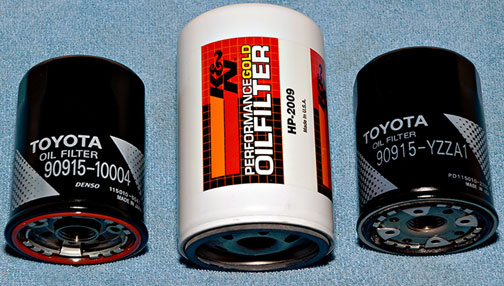Oil Filters: Comparison
distilled from Stan, Raggedy1, and cjl on EliseTalk.com
Specification:
- high burst strength
- antidrainback valve
- 3/4-16 thread
- the boss the oil filter's o-ring seals against is very large, but filter must seal against it.
Filters (Toyota):
- Toyota 90915-10004 is the proper factory oil filter
- Toyota 90915-YZZA1 slightly less nice than above
(see also list below)
Filters (aftermarket):
- 209 by Mobil 1 (appears to be made by Champion) 12 microns
- 2009 by K&N (appears to be made by Champion) 15-20 microns and flows better
- K&N flows better than the Mobil 1
- 25-262 or 25-462 Canton Mecca high flow zero bypassing 8 micron oil filter (aluminum cased filter that has replaceable inserts, costs about 100 bucks.
Comments:
Stan talking about the bypass valve,
"A third example, which you should never experience with frequent oil and filter changes, is when a filter becomes clogged. A spin-on filter can commonly hold 10 to 20 grams of trash before it becomes fully clogged. The bypass valve opening is the only way to keep the motor from becoming oil-starved if the filter becomes clogged.
"According to Purolator, the Honda OEM filter bypass setting is 12 to 14 psi, and that is how they build their motorcycle oil filter. WIX (NAPA Gold) builds their motorcycle and automobile oil filters with a bypass setting of 8 to 11 psi, while AC Delco builds theirs to a setting of 11 to 17 psi. How much do these differences matter? I don't think anyone knows, even the engineers, and each has its own set of advantages and disadvantages."
Shinoo talking about frequency:
"I've never heard of the bypass valve actuating unless the filter is plugged. This is a safety valve that should not come into action under normal use or higher rpms, cold start, etc. I'll check into this further.
"Oil filters (actually all liquid filters) have lower particle efficiency when they are new. They get 'better' at removing particles when they begin to load up. Naturally they will begin restricting flow when they get too loaded. One of my customers in Germany, Mahle Filterwerke, could not understand why Americans changed their filters so often."

picture courtesy of Stan from EliseTalk.com
| Toyota OE #90915-YZZA1 |
Less than optimal filter, black gasket, black housing.
~$8 at any Toyota Parts Desk ($4 online) |
|
 |
||
| Toyota OE #90915-10004 |
Optimal, red gasket, black housing, used by most Lotus Dealers.
~$12 at some local Toyota Parts Desk. Some dealers won’t order it, some will. Keep dialing. ($8 online) |
|
 |
||
| Toyota OE #90915-YZZD1 |
Still less optimal, but slightly bigger than the YZZA1 filter, but of the same (sub par) “grade” of construction as the YZZA1. OE for Lexus IS300 motor,
~$8 at any Toyota Parts Desk ($4 online) |
|
 |
||
| Toyota Racing Development #00602-90915-006 | USA made YZZA1 and 10004 replacement, not known to be used on an Elise yet. ~$13 online | |
 |
||
| Toyota Racing Development #00642-90915-003 | Japanese made YZZA1 and 10004 replacement, not known to be used on an Elise yet. ~$22 online | |
 |
||
| Toyota Racing Development #90915-001 | Japanese made (red housing) replacement, seems to be preferred by many eTalkers, but I cannot find much information on this filter. ~$24 online. | |
 |
||
| K&N HP-2009 | Optimal filter, used by many eTalkers (endorsed by Stan!), good filtration (better than the OE stuff) and good flow. ~$12 at most auto parts stores. | |
 |
||
Known filters that DO NOT work:
TRD #90915-07
